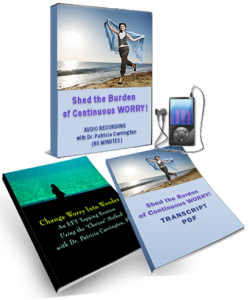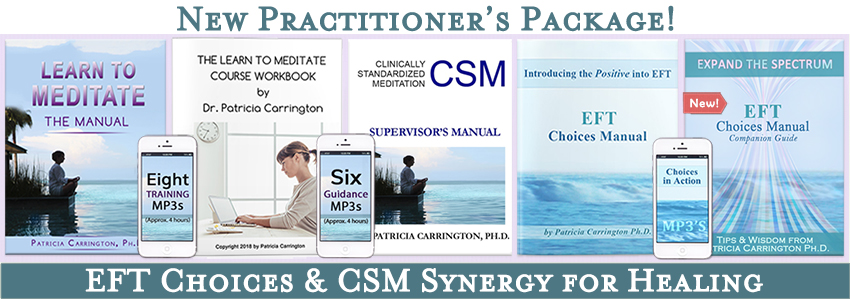 If you experience exam anxiety, you know the symptoms well. It can make you feel despair when you are facing an examination. You may shake or tremble at the mere thought of it. You may experience ice-cold clammy hands and feel panic, or your mind might go completely “blank” during the examination.
If you experience exam anxiety, you know the symptoms well. It can make you feel despair when you are facing an examination. You may shake or tremble at the mere thought of it. You may experience ice-cold clammy hands and feel panic, or your mind might go completely “blank” during the examination.
Exam anxiety can also cause people to have headaches, nausea, and many other unpleasant physical symptoms. It is a serious problem recognized by educators throughout the world.
Emotional Freedom Technique (EFT) can be remarkably helpful in overcoming this prevalent type of anxiety. By definition, exam anxiety is not “rational,” and therefore does not lend itself well to reasoning one’s way out of it. A much more effective approach than rational thought is required, something that can dispel the underlying sense of fear that drives the exam anxiousness. EFT fits this description well.
It’s important to note that exam anxiety does not refer to a student who takes an exam without having studied for it and is understandably realistically anxious about taking it, or to a student who is unable to understand the subject matter in a particular course and is therefore realistically anxious about taking an exam based on it. Such reality-based fears are not “exam anxiety.”
Exam anxiety is an unreasonable fear of a test in a student who is otherwise reasonably well prepared to take it. People who have exam anxiety may be extremely fearful that they are not going to measure up, that somehow the test is going to reveal their weaknesses.
It is therefore particularly important, if you apply EFT to this problem, to discover the specifics of your fear, the content of the “self-talk” with which you harass yourself with before and during an exam. What are you thinking about yourself as you approach the exam that is so self-deprecating that it terrifies you?
An Exam Can be a Challenge to Self Worth
One of the most frequent causes of exam anxiety is a perception that the feared examination poses a threat to one’s basic sense of self worth. Often, that feeling of threat has deep-seated roots. Tracing the causes of your self-doubt and self-criticism, and tapping down the anxiety about a specific triggering event from your past, can be one of the most valuable tactics to use.
The challenge to self-worth that an exam represents can manifest in various ways, but in my experience working with exam-anxious students I have noticed that a most frequent response is an all-pervasive fear of being seen as “stupid.”
An Exam Can Invite Unfavorable Comparison with Others
One of the most frequent reasons a person may feel they are too stupid to do well on an exam is because they are comparing themselves to someone else whom they perceive as much brighter, more successful, etc., than themselves, and therefore much more likely to do better on an examination. Perhaps an exam-anxious person was unfavorably compared to a sibling or to children at school when they were young, or they may have created this type of unfavorable comparison in their own mind. Whatever its source, an unfavorable comparison with another person can seriously damage a person’s sense of self-worth.
An Exam Can Seem to Impose Impossible Standards
Early childhood experiences that can lead a child to feel “stupid” can involve the manner in which parents evaluate their children’s achievements in school or elsewhere. For example, if a child were to bring home an exam paper on which he or she got a grade of 98, and the parent asks, “Why didn’t you get 100?” (Or one of many variations on this scenario, the shows a total lack of appreciation for what the child did achieve.), the child may experience a sense of hopelessness and may feel unable to do well enough on any examination.
Children often encounter many experiences, particularly in school, that can inadvertently make them feel “dumb,” when they are actually quite intelligent. A teacher’s scribbled comments on a student’s examination paper can either create a feeling of confidence and pride, or a sinking feeling of never being able to measure up no matter what they do — depending on how the comments are worded. Actually, many examinations in the school system are designed to discover what students do not know, and what they do know may not register as being important. A student may feel that he/she must be “really dumb” to have achieved, for example, a grade of 85 on an exam, because 15% of the answers wrong.
Exams Threaten to Expose a Student’s Inadequacies
This type of fear is common in exam anxiety, and fortunately, it responds extremely well to the use of EFT. There are several ways to apply EFT to this problem and one stands out particularly.
Initially, you try to pinpoint any childhood experiences associated with taking exams and determine when the fear started. Sometimes the fear did not commence until high school, or later, when some unfortunate experience with an examination caused deep distress, but more often, the fear started early in life, usually during the grade school years.
Whatever age it commenced, there may be vivid and discouraging memories about exams as a result. Were you constantly berated for not being the “best in the class” or told that you were the “dumb one” in the family, — or what exactly did happen? You will need to know this to formulate and tap on correct EFT statements for the situation, or multiple situations.
General EFT Phrases for Exam Anxiety
The default self-acceptance phrase, “I deeply and completely accept myself“, is appropriate for dealing with any sense of inadequacy and therefore can be an effective antidote to the feeling of futility and failure that an exam-anxious person experiences. Similarly, the default Choices phrase, “I choose to be calm and confident,” can also be very useful, as in, “Even though I could never please my father no matter what marks were, I choose to be calm and confident today.” Another effective Choice for this purpose might be, “…I choose to know that today things are different.“
Using a Personal Resource State to Combat Exam Anxiety
In order to overcome the feeling of inadequacy with respect to taking exams, it can be very useful to access a Personal Resource State. This is a memory of any time in your life when you were able to solve a problem that you did not expect you would be able to solve.
The memory of your resourcefulness need not be associated with an academic problem; it can be a memory of solving anything. You might remember, for example, how you once surprised yourself by figuring out how to repair your bicycle when it broke down or how you solved a problem for your soccer team at an important game when your teammates were floundering, etc. Often the person who feels stupid
When you are facing an academic challenge, you should be able to remember some type of success that you experienced in a non-academic area, and that will work perfectly as a Personal Resource.
When you have determined the Personal Resource State, vividly recall your moment of success, and in particular, recall the feelings that you experienced at that time. Your Resource State can then lead to some extremely valuable EFT choices. For example, you might say:
“Even though I’m terrified of taking that exam, I choose to remember fixing that bicycle.”
Or,
“Even though I’m terrified of taking that exam, I choose to feel the way I did when I was the one who remembered the way to get home when no one else did.”
From another perspective, the Personal Resource State might not be a just memory of your behavior. It could be a memory of another person’s behavior whose resourcefulness at solving problems you particularly admired, in which case you might say something like:
“Even though I’m terrified (afraid, anxious etc.) about taking that exam, I choose to be like (the other person’s name).” If that person seemed to them able to conquer an exam with perfect ease, then this could be a highly effective Choice. (For more ideas on the use of Personal Resource States for EFT, see Chapter 8 of my Choices Manual)
A Fear of Unexpected Exam Questions
One thing that often troubles people who suffer from exam anxiety is a fear that they will not be able to handle unexpected questions that are “sprung on them” during a test. If you experience this fear, reframe the situation so that you can actually feel good about unexpected challenges an exam may pose.
The truth is that humans, as well as all animals, thrive on the unexpected. It is the source of adventure and verve in life. How much fun would it be if we could always predict exactly what was going to happen to us; if nothing was a surprise?
You can use our human tendency to relish adventure and feel excited when confronted by the unexpected to reframe your exam anxiety very effectively. To do this you use a Choice such as:
“Even though I’m afraid that they will spring a surprise question on me, I choose to remember how much fun it was being surprised at my birthday party (or on a holiday, or by someone else’s response to them, etc.)”
The point is that you want to remember a time (or times) when the “unexpected” was unexpectedly pleasant, and insert mention of it in your Choice. A general Choice along these lines might therefore be,
“…. I choose to enjoy the challenge of unexpected things.”
Remembering Unpleasant Exams from the Past
A useful approach to handling exam anxiety with EFT is to explore your experiences with past examinations. We all have a long history of taking tests in school, and one of the features of exam anxiety is that once we have experienced difficulty taking an exam it is all too easy to remember that difficulty the next time we take one.
For example, suppose a person had difficulty focusing on the questions during a particular exam because of their anxiety. This could create a fear in them of not being able to focus in the future when they take the next exam, which in turn would be very likely to create a self fulfilling prophesy. Remembering a time when you were remarkably focused on some task (usually a task quite different from exam taking) can be very valuable.
For example, you might remember a time when you were driving through lashing rain and had to focus intently on the road in order to guide your vehicle safely through the storm, and you were able to do this successfully. In this scenario, you might formulate a Choice like this:
“Even though I’m afraid I won’t be able to focus during the exam, I choose to remember how well I focused on the road that stormy night!”
Fear of “Blanking Out” during an Exam
One of the most troublesome fears of exam-anxious people is that they will “blank out” during the exam and be unable to think at all. Try to remember that even if it does occur, it is usually not a permanent experience — people have always recovered from the blank out during an exam and their mind did eventually begin to work normally again.
Actually, a certain amount of “blanking out” during an examination may be useful because it can allow your subconscious to work on the problem, and when your mind comes back into focus, the answer may just pop into your mind. To reinforce these reframes, you try Choices such as the following:
“Even though I’m afraid that I’ll blank out during an exam, I choose to see blanking out as an opportunity to let my subconscious do the job for me.”
Or,
“…I choose to remember that my mind will come back into focus because it always has.”
The Behavior of Others during an Exam Can Be Alarming
If you are an anxious person to begin with, it is very easy to lose composure if, when going into an exam, you meet someone who is unbearably nervous about taking it. We all tend to pick-up on the concerns and fears of others.
The thought of seeing another student do better than you can also trigger anxiousness. If you feel distressed when other exam takers are finishing before you, handing in their exams early, and marching confidently out of the room,” it can be very helpful to use a Choice such as:
“Even though I get upset when I see other people finishing first, I choose to remember that because they turn in their exam early that doesn’t necessarily mean that they did well on it.”
This is in fact true. Some students habitually rush through an exam and turn it in early to avoid confronting their own lack of knowledge. Others just give up, put down any answers, and in effect flee from the situation by turning their exam in early. It is not always the best students who finish first and choosing to remember this can be very reassuring.
Role-Playing the Exam
A great way to help overcome exam anxiety with EFT is to role-play the exam with a family member or friend. To do this, you may want to take the role of the teacher or monitor who hands out the exam, or of the person reporting the results of the exam to the student. In enacting this role, you should strive to make the experience as difficult as possible for the test-taker by pretending to be a strong disciplinarian rather than a kindly teacher.
You then use EFT to tap on any anxiety that emerged during your role-playing, and retake your Intensity Rating. If necessary, keep repeating the sequence, which consists of role-playing then tapping, until your reaction changes markedly. (See my article for more suggestions on how to use role-playing in EFT.)
More “Choices Statements”
There are some other general “Choices” statements that can be used productively for exam anxiety, such as:
“Even though I’m afraid of this exam, I choose to handle it expertly.”
Or,
“Even though I’m afraid of being ambushed by surprise questions on the exam, I choose to rely on my good coping abilities to answer them perfectly.“
Or,
“Even though I’m afraid of this exam, I choose to be calm and confident and remember my strengths.”
Exam anxiety is a “natural” for EFT because it has definite origins that are traceable, and “tap-able.” I can imagine a day when EFT will routinely be used in schools and other places of learning to overcome this widespread problem in education. You can be in the forefront of this educational advance by using it right now for that purpose. If you do, don’t be surprised to find yourself achieving some remarkable successes!
Good luck with this!
Related Product
 Shed the Burdon of Continuous Worry
Shed the Burdon of Continuous Worry
Learn how you can eliminate persistent worry that may be hampering your life and replace it with intelligent concern and highly effective planning by using the Shed the Burden of Continuous Worry quick-training package. As you listen, you will experience a burden of worry far heavier than you may have being lifted from your shoulders.






